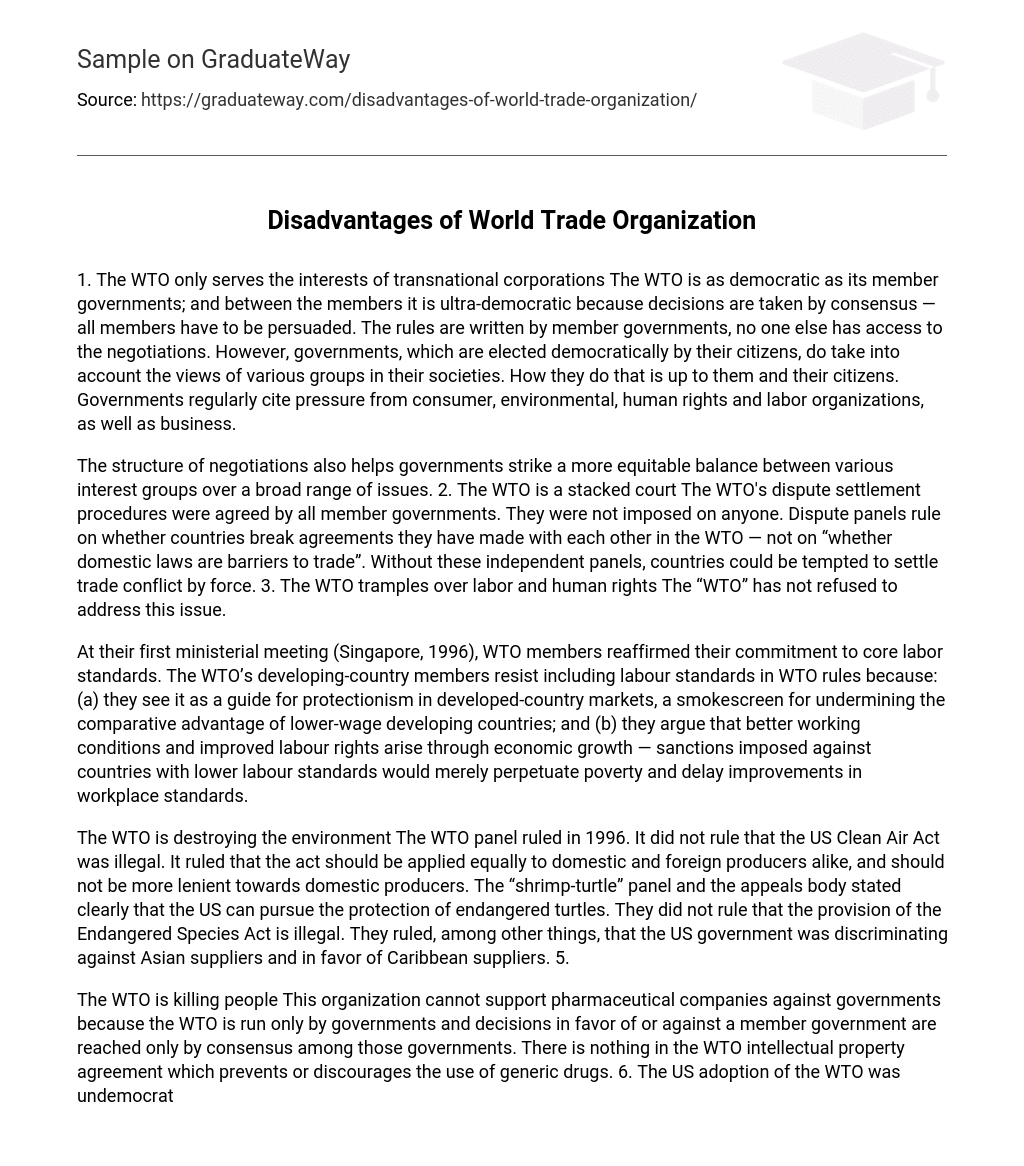The World Trade Organization (WTO) mainly serves the interests of multinational companies. Its decision-making process relies on consensus among all members. Rulemaking is solely under the authority of member governments, with no participation from other entities. Nevertheless, elected governments take into account diverse perspectives within their societies when addressing these matters, including feedback from consumer groups, environmental organizations, human rights advocates, labor unions, and businesses.
Negotiations in the structure help governments achieve a fairer balance among different interest groups across various matters. Some perceive the WTO as biased. However, it should be noted that all member governments collectively agreed upon the dispute settlement procedures of the WTO and they were not imposed on any nation. Dispute panels within the WTO determine if countries have violated agreements made with each other in the organization, rather than assessing if domestic laws hinder trade. Independent panels existing prevent countries from resorting to force when resolving trade conflicts. It is crucial to emphasize that despite criticism suggesting otherwise, the issue of labor and human rights has not been overlooked by the WTO.
In their initial ministerial meeting in Singapore in 1996, members of the World Trade Organization (WTO) expressed their commitment to basic labor standards. However, developing countries within the WTO are hesitant to incorporate labor standards into WTO regulations for two primary reasons. Firstly, they perceive it as a tactic to promote protectionism in developed-country markets and undermine the competitive advantage of lower-wage developing nations. Secondly, they contend that enhanced working conditions and improved labor rights naturally result from economic growth. They argue that imposing sanctions on countries with lower labor standards would only prolong poverty and hinder progress in workplace standards.
In 1996, the WTO panel decided that the US Clean Air Act should treat domestic and foreign producers equally without favoring domestic ones. The “shrimp-turtle” panel and appeals body acknowledged the US’s right to safeguard endangered turtles and did not find fault with the provision of the Endangered Species Act. However, they concluded that the US government was showing bias against Asian suppliers while favoring Caribbean suppliers.
Allegations have been made against the World Trade Organization (WTO) for causing harm to individuals. However, it is important to note that the organization, which operates under government governance, cannot show favoritism towards pharmaceutical companies over governments. The decisions made in favor or against a member government can only be reached through consensus among these governments.
It should be emphasized that the WTO intellectual property agreement does not contain any provisions that restrict the use of generic drugs. Furthermore, some individuals criticized the United States’ adoption of the WTO as undemocratic. Nevertheless, each country’s process of ratifying WTO agreements is considered an internal matter and the WTO cannot comment or speculate on the outcome of a vote under different circumstances.
During the WTO negotiations from 1986-1994, a global democratic public discussion occurred. This debate involved multiple countries, including the United States, and influenced their positions in these negotiations. The ratification phase, occurring from April to December 1994, included over 100 nations rather than just the United States. The promotion of equality among countries is highlighted by the WTO through the principle of most-favored-nation treatment.
The concept of equal treatment is crucial for ensuring fairness and effectiveness. However, the principle of most-favored-nation acknowledges that there exist disparities in how corporations are treated. Governments possess the authority to bestow rewards or impose penalties on companies, but typically they must apply identical standards to all foreign firms (though certain restrictions may be present). Furthermore, it is believed by some that the World Trade Organization (WTO) exacerbates inequality. According to this perspective, “Free trade does not benefit the majority of the world. In a recent period spanning from 1960 to 1998, which witnessed significant growth in global trade and investment, both international and domestic inequality worsened.”
The richest 20 percent of the global population consume 86 percent of the world’s resources, leaving only 14 percent for the poorest 80 percent, according to the UN Development Program. The World Trade Organization (WTO) has contributed to this inequality by promoting foreign investment and facilitating production in countries with cheap labor and minimal environmental costs. This has resulted in developed nations experiencing lower wages and weakened environmental standards as they compete globally.
Furthermore, the WTO has established a supranational court system that can economically punish countries to enforce its rulings, effectively replacing elected governments with an unaccountable corporate-supported entity. A recent example of this is the WTO’s decision against the European Union’s ban on beef raised using artificial growth hormones, which is considered a trade barrier. As a result, the EU now faces options such as lifting the ban or facing severe penalties, diminishing governments’ ability to act in line with public interest. It is evident that support for free trade and the WTO is declining.
While some protesters argue that global opposition towards the WTO is growing, the fact that countries such as China, Russia, and Andorra are willing to join the WTO contradicts this belief. This suggests that a considerable portion of the world acknowledges the potential advantages of the WTO system for their economic prospects. Additionally, public opinion surveys indicate that individuals in both the US and other nations generally express support for the concept of more open trade, notwithstanding their reservations about specific aspects.





